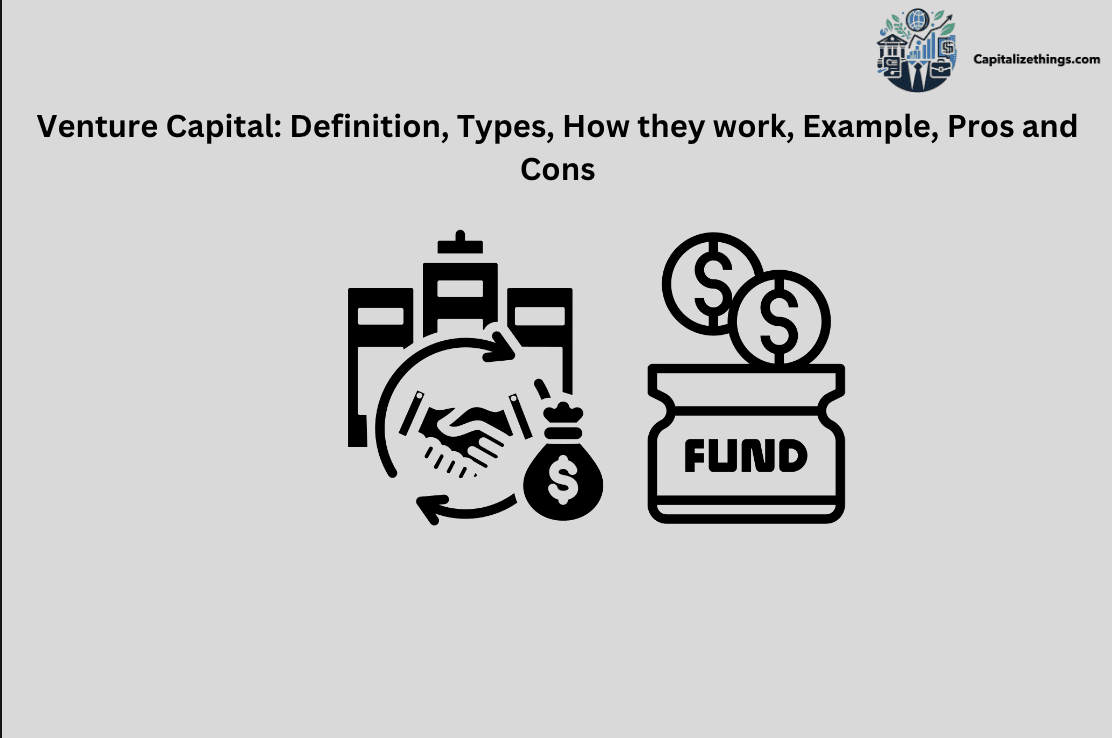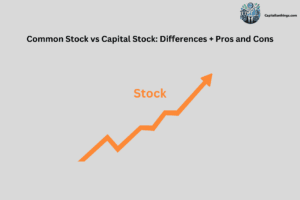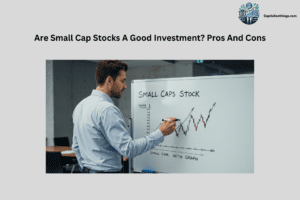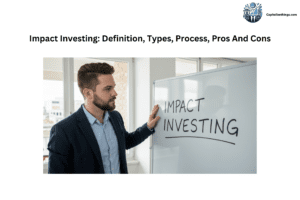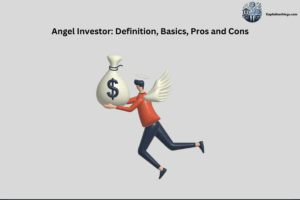Venture capital is a type of private equity that provides funding to startups and small businesses with high growth potential. Investors or firms provide this funding in exchange for equity, or ownership stakes, in the company. This type of funding is essential for early-stage companies that do not have access to traditional loans. Venture capital helps companies develop and expand their operations, often playing a key role in bringing innovative products or services to the market. There are several types of venture capital. Seed capital is the initial funding used to develop an idea. Startup capital is for companies needing to begin operations or market their products.
Growth capital helps businesses scale up their operations. Mezzanine financing is a blend of debt and equity used before an initial public offering (IPO). Lastly, late-stage capital is used for mature businesses looking to expand further or prepare for a major event like an IPO. Venture capitalists work by pooling funds from various investors into a venture capital fund. They evaluate startups with high potential, provide funding in exchange for equity, and offer mentorship. The goal is to grow the business, and VCs typically exit through an acquisition or IPO. These exits offer high returns on investment if the company performs well.
An example of venture capital investment is Sequoia Capital, which funded early-stage companies like Google and Airbnb. These companies started small but grew into global giants thanks to venture capital. This highlights how impactful venture capital can be for businesses with the potential for exponential growth. The pros of venture capital include access to significant funding, guidance from experienced investors, and valuable networking opportunities. However, it comes with cons like the loss of control over business decisions, high growth expectations, and the pressure to sell or go public.
What is Venture Capital?
Venture capital is a form of private equity financing. It helps startups and emerging companies grow. Firms or investors provide funds to these small businesses. They invest money in exchange for part ownership of the company. This funding helps new businesses expand. Venture capital plays an important role in helping companies with the highest growth potential.
Firms that offer venture capital focus on startups and emerging companies. They invest funds in businesses with new ideas. This form of private equity financing gives startups the boost they need. It helps these companies launch their products or services. Firms want the best return from their investment by supporting businesses with the biggest growth opportunities.
Venture capital comes from funds raised by firms and investors. This form of private equity financing gives emerging companies the chance to grow. These businesses use the funds to expand and develop. Startups benefit greatly from this support. Venture capital provides them with the resources to succeed in the competitive business world.
Is Venture Capital A Type Of Investment?
Yes, venture capital is a type of investment. Investors give money to startups and small businesses. They receive a share of the company in return. This form of funding is crucial because it allows companies to grow. Venture capital investors look for companies with high capacity. They want to make the largest return on their investment.
This kind of funding isn’t the same as other types of investing. Venture capital specializes in early-stage companies. These companies often can’t get loans from banks. Investors take bigger risks in venture capital. They hope the companies will be successful and make substantial returns for them.
Can Regular People Invest In Venture Capital?
Regular people typically cannot directly invest in venture capital. This type of investment is limited to firms and wealthy investors. These investors need a lot of money. They also must meet specific requirements to invest. Regular people have limited access. Venture capital involves risks, so firms require qualified investors.
Most undertaking capital investments aren’t to be had to the public. Only positive firms or finances manage these investments. Regular people can put money into different styles of corporations. Venture capital requires special connections and large quantities of money. It is often for people with the largest financial resources and revel in making an investment.
According to SEC regulations updated in 2023, venture capital investors must be “accredited investors” with either $1 million in net worth or annual income exceeding $200,000. However, the JOBS Act has enabled some accessibility through equity crowdfunding platforms, as reported by the Wharton School of Business (2024).
What Is A Venture Capital Fund Of Funds?
A venture capital fund of funds invests in other venture capital funds. This means it does not invest directly in companies. Instead, it spreads capital across multiple venture funds. This enables reduced risks for investors. A fund of funds gives investors more chances to benefit from successful organizations.
The fund of funds model is important for those who don’t want to select individual funds. It allows them to invest in many funds simultaneously. This gives investors access to multiple startups through one investment. It is one of the safer ways to invest in venture capital.
Large firms often manage venture capital fund of funds. They help investors participate in the venture capital market. The firms select the best funds for their clients. This allows investors to benefit from professional knowledge. A fund of funds is a strategic way to invest for those who want diverse investments.
What Is The Definition Of Venture Capital In Business?
Venture capital in business is financial investment in new or growing companies in exchange for equity. It is a form of private equity financing. Firms or investors provide money to startups in exchange for equity. Venture capital focuses on companies with high growth potential. These companies need funds to develop products or services.
In business, venture capital is essential for innovation. It helps companies develop rapidly. Investors look for companies that can become large in the future. Venture capital plays a major role in the tech and biotech industries. These fields often need large amounts of money to develop new ideas.
Venture capital investors also provide more than just money. They assist with business decisions and provide advice to company founders. Their goal is to grow the company quickly. Venture capital is often seen as one of the best approaches to fund high-growth companies. It supports startups in their early stages.
What Are The 4 P’s Of Venture Capital?
The 4 P’s of venture capital are People, Product, Potential, and Plan. People refer to the team behind the startup. Investors want a strong team. They believe a good team can overcome challenges. People are often the most important factor in a venture capital deal. Product refers to what the company sells. Investors want a product that solves a problem or offers something new.
The product should stand out in the market. It must have the potential to grow and attract customers. A unique product helps attract venture capital. Potential is the company’s growth ability. Investors look for companies that can grow fast. The best companies have high growth potential. This means the company can expand quickly in the market. Venture capital investors want the biggest returns, so they focus on potential.
According to a 2024 study by Preqin, venture capital firms using the 4 P’s framework have shown 24% higher success rates in portfolio companies.
What Are The 4 C’s Of Venture Capital?
The 4 C’s of venture capital are Company, Customer, Competition, and Capital. The company refers to the startup or business seeking investment. Investors look at how strong the company is. They want to see a clear vision for success. A good company has a solid plan for growth. Customer means the people who will buy the product. Venture capital investors look at the target market.
They want to know if there is a demand for the product. The company needs a strong customer base to succeed. Without customers, the business will not grow. Competition refers to other businesses offering similar products. Investors want to know how the company stands out. They look for businesses with an edge over the competition. Strong companies have a unique product or service. They must be the best in the market to attract investors.
Research by McKinsey & Company (2024) reveals that startups focusing on the 4 C’s framework have a 35% higher survival rate after five years.
What Are The 4 Ts Of Venture Capital?
The 4 T’s of venture capital are Team, Traction, Technology, and Timing. The team is the group of people running the company. A strong team is crucial for success. Venture capital investors look for teams with experience and skill. A good team can handle challenges and grow the business. Traction means the progress the company has made. Venture capital investors want to see that the business has already gained customers or made sales.
Strong traction shows that the company is on the right path. It proves that the product is working in the market. Technology refers to the product or service’s technical side. Companies with innovative technology attract venture capital. The technology must solve a problem or offer something new. Investors look for businesses that use the best technology to grow quickly. Strong technology is key to attracting investors.
A longitudinal study by the University of California Berkeley’s Haas School of Business tracked 1,000 startups over seven years, finding that balanced strength across the 4 T’s resulted in 42% higher valuations.
What Is A VC Firm?
A venture capital (VC) firm is a company that professionally invests in startups. These firms raise funds from investors. They supply money to early-stage companies with high growth potential. In return, they get equity. The goal is to help businesses grow and make a profit when they sell or go public.
A well-known VC firm is Sequoia Capital. Sequoia invested in companies like Google and Airbnb. They helped these companies grow from startups to giants. VC firms like Sequoia are essential for developing new industries. They provide the money and guidance startups need to succeed.
What Is Meant By Venture Capital Financing?
Venture capital financing is the process of funding startups in exchange for equity ownership. It is a form of private equity financing. Investors provide funds in exchange for part ownership of the company. The goal is to help the business grow. Venture capital financing is for companies that can’t get conventional loans.
This type of financing focuses on high-risk, high-reward businesses. Investors seek companies with strong growth potential. They take a risk by investing in startups. However, if the organization succeeds, they make substantial returns. Venture capital financing enables new companies to bring their ideas to life.
What Are The Three Types Of Venture Capital Financing?
There are three types of venture capital financing: Seed Capital, Startup Capital, and Expansion Capital. Seed capital is the money used to develop an idea. Investors provide small amounts of money at the earliest stages. It helps create a business plan and start operations.
Startup capital is for companies that have already started operations. Investors provide funds to grow the business. This helps with marketing, hiring staff, and developing products. Startup capital is important for companies entering the market.
What Is The Structure Of A Venture Capital Firm?
The structure of a venture capital firm includes General Partners, Limited Partners, and Portfolio Companies. General partners manage the firm. They make investment choices and work with startups. They get a percentage of the income if the business succeeds. General partners are vital leaders in venture capital.
Limited partners provide the capital. These are normally large investors like pension funds or wealthy individuals. Limited partners give their funds to the general partners to invest. They share in the profits but do not control the organization. They trust the general partners make the best choices.
Portfolio companies are the startups that receive the investment. The venture capital firm works closely with them to help them grow. Portfolio companies get funding, mentorship, and connections. This structure is fundamental to how venture capital firms operate and invest in the market.
What Is The Origin And Growth Of Venture Capital?
Venture capital originated in the United States in the 1940s, beginning with wealthy families and private investors. They provided funds to new businesses. The industry grew rapidly during the tech boom of the 1980s and 1990s. Venture capital firms started investing heavily in technology companies.
Over time, venture capital expanded beyond tech. It now includes industries like healthcare and biotech. The growth of venture capital has been driven by innovation. Today, it is one of the most important ways to fund new businesses. Venture capital continues to support high-growth startups across the world.
When Did Corporate Venture Capital Start?
Corporate venture capital started in the 1960s. Large companies began investing in startups. They wanted to stay competitive by backing new technologies. This was different from traditional venture capital, which focused on private investors. Corporate venture capital is used to fund innovation within large companies.
In the 1980s, corporate venture capital became more common. Companies like Intel and Microsoft began investing in startups. They wanted to stay ahead in the rapidly changing tech industry. Today, many corporations have venture capital arms to help them stay innovative and grow in the market.
What Is The Process Of Venture Capital?
The process of venture capital includes Sourcing, Due Diligence, Investment, and Exit. First, venture capitalists find potential startups. This is called sourcing. They look for companies with strong growth potential. Sourcing is key to finding the best investments.
Next is due diligence. Investors research the company’s finances, team, and market. This helps them decide if the investment is worth the risk. Due diligence is important for making smart investment choices. Once the research is done, the investment stage happens. Investors provide money in exchange for equity.
What Is The Power Rule Venture Capital?
The power rule in venture capital states that a small percentage (about 20%) of investments generate roughly 80% of returns. Venture capitalists put money into many startups, but only a few succeed. These few make the most money. The power rule is vital because it shows why venture capitalists take risks.
Most startups fail, but those that succeed make huge profits. The power rule helps venture capitalists understand which investments will pay off. They recognize high-potential companies. The goal is to find the biggest winners that will make up for the losses from other investments.
What Are The Different Types Of Venture Capitalists?
The main types of venture capitalists are Angel Investors, Corporate Venture Capitalists, and Institutional Venture Capitalists. Angel Investors provide their own money to startups. They invest at early stages. Angel investors are often successful entrepreneurs themselves. They want to help other entrepreneurs succeed. Their investments are usually smaller than venture capital firms.
Corporate Venture Capitalists work for big companies. They invest in startups that align with their company’s goals. Corporate venture capitalists focus on innovation. They help companies stay competitive. These investors bring both money and connections.
Institutional Venture Capitalists work for venture capital firms. They invest large sums of money from funds they manage. Institutional venture capitalists provide mentorship and help businesses grow fast. They aim for high returns by picking the best companies.
What Is The Deal Flow Funnel In Venture Capital?
The deal flow funnel is a systematic process of finding, evaluating, and filtering investment opportunities in venture capital. It starts with Sourcing. Venture capitalists find potential startups to invest in. They use their networks to discover companies. Sourcing allows them to find unique opportunities.
Next is Screening. Investors assess the startups they find. They look at the team, product, and market potential. Screening helps narrow down the options. After screening comes Due Diligence. Venture capitalists study the top companies. This stage is crucial for making smart investment decisions.
What Are The Top Features Of Venture Capital?
The Top 22 Features Of Venture Capital Are:
- Expansion Capability – The ability for a company to grow quickly, appealing to venture capitalists looking for high returns through scalability and market reach.
- Expansion Funding – Capital provided to help companies grow by hiring, developing products, or expanding to new markets.
- Extreme Levels of Risk – Venture capital is highly risky, as many startups fail, but the potential returns are high when they succeed.
- Investment Commitment – Venture capitalists commit to long-term investments, allowing companies time to grow without immediate return pressures.
- Long-Term Horizon – A focus on several years, giving companies time to develop and expand before providing returns to investors.
- Ownership Dilution – When new investors join, the original owner’s share decreases, a common occurrence as companies raise venture capital.
- Access to Capital – Venture capitalists provide essential funding, enabling companies to hire, market, and grow when other sources are limited.
- Bridge Financing – Short-term funding provided to help companies during financial gaps, keeping operations running until further funding.
- Early Phase Investment – Funding provided to companies at an early stage, supporting them in product development and market entry.
- Equity Ownership – Investors receive a company share in exchange for their investment, gaining influence over important decisions.
- Management Participation – Venture capitalists often participate in company management, joining boards and advising on strategy.
- Mentoring – Investors offer guidance and advice, helping founders navigate business challenges and grow effectively.
- Mismatch Between Entrepreneurs and VC Investors – Disagreements between founders and investors on vision and goals can hinder progress.
- Network Effects – The value of a company grows as more people use its product, leading to accelerated expansion.
- During Competition – Venture capitalists support companies with funds and strategies to compete in challenging markets.
- Entrepreneurs’ Limited Market Information – Investors provide valuable industry insights to entrepreneurs, helping them make informed decisions.
- Exit Strategy – Investors look for ways to sell their shares, commonly through a company sale or IPO, to gain returns.
- Fund Representation – Venture capitalists act on behalf of the funds they manage, prioritizing growth and returns.
- Innovative Product – Venture capitalists prefer companies with unique products that solve problems, driving market differentiation.
- Liquidity – The ease of selling shares in the future; in venture capital, liquidity is low, often requiring years to realize returns.
- Loss of Control – Founders give up some control to investors, who join the board and influence decisions.
- No Repayments – Unlike loans, venture capital does not require repayment; investors earn returns only if the company succeeds.
1. Expansion Capability
Expansion capability means a company can grow fast. Venture capitalists want businesses that can scale quickly. This feature shows the business has a good chance to become much bigger. Strong expansion capability is important for attracting investors who want high returns. It also helps businesses reach more markets.
2. Expansion Funding
Expansion funding is money given to help a company grow. Venture capitalists provide these funds to businesses that are ready to expand. This allows the company to hire more people, develop new products, or enter new markets. Expansion funding is essential for taking a successful business to the next level.
3. Extreme Levels of Risk
Venture capital involves extreme levels of risk. Investors put money into companies that fail. Many startups do not succeed. However, if the business grows, the returns are big. The risk is high because new companies often face challenges. Investors take this risk to find the best opportunities.
4. Investment Commitment
Investment commitment means venture capitalists invest for a long time. They do not expect quick returns. They provide money and support for several years. This long-term commitment helps businesses grow steadily. Venture capitalists want the company to become strong before they sell their shares.
5. Long-Term Horizon
Venture capital has a long-term horizon. Investors put money into businesses for several years. This means they wait for the company to grow before getting a return. The long-term focus allows companies to develop without pressure. It gives them time to build products and gain customers.
6. Ownership Dilution
Ownership dilution happens when new investors join. This means the original owners have less control of the company. Venture capitalists take a share of the business. As more investors join, the owner’s share becomes smaller. Ownership dilution is common when raising venture capital funds for growth.
7. Access to Capital
Access to capital means a company gets money to grow. Venture capitalists provide large amounts of money that startups need. Without access to capital, many new businesses cannot develop. It helps companies hire, market, and expand. Venture capitalists open doors to funding that is not easy to find elsewhere.
8. Bridge Financing
Bridge financing is a short-term loan to help businesses during tough times. It provides money until the company can raise more funds. Venture capitalists often provide bridge financing. It helps businesses keep going when they need quick cash. Bridge financing is important for staying afloat before bigger investments come in.
9. Early Phase Investment
Early phase investment means venture capitalists provide money to companies in their early stages. This helps startups develop their product and enter the market. Early phase investment is risky because the company is new. Venture capitalists take this risk to support innovation and find the next big company.
10. Equity Ownership
Equity ownership means venture capitalists own part of the company. They receive a share in exchange for their investment. This gives them control over important decisions. Equity ownership aligns the investor’s goals with the company’s success. As the company grows, the value of their share increases.
11. Management Participation
Management participation means venture capitalists help run the company. They join the board and give advice to founders. Their experience helps guide the business. Management participation is important because investors bring knowledge and connections. They work with the team to ensure the company grows successfully.
12. Mentoring
Mentoring is a key feature of venture capital. Investors help founders by sharing advice and knowledge. Mentors guide entrepreneurs through challenges and teach them how to run a business. Venture capitalists act as mentors to help the company succeed. Mentoring helps startups grow faster and avoid common mistakes.
13. Mismatch Between Entrepreneurs and VC Investors
A mismatch between entrepreneurs and VC investors can happen. Sometimes, the goals of the founders and the investors are different. This creates problems in decision-making. A mismatch happens when the company and investor do not share the same vision. This can hurt the company’s growth.
14. Network Effects
Network effects mean the value of a company increases as more people use its product. Venture capitalists look for companies with strong network effects. These businesses grow faster because each new customer makes the product more valuable. Network effects help companies gain more users and expand quickly.
15. During Competition
During competition, venture capitalists help companies stay strong. They provide funds to compete in the market. Competition is tough for new businesses. Venture capitalists support startups to beat competitors. They offer money, advice, and strategies to win. This helps the company survive in a crowded industry.
16. Entrepreneurs’ Limited Market Information
Entrepreneurs often have limited market information. They do not know enough about the industry or competitors. Venture capitalists help by sharing market knowledge. They use their experience to guide the company. Limited market information can hurt startups, but investors provide the insights needed to grow.
17. Exit Strategy
Exit strategy is the plan for investors to sell their share in the company. Venture capitalists look for a way to exit and make a profit. Common exit strategies include selling the company or going public. A clear exit strategy is important for investors to get a return on their investment.
18. Fund Representation
Fund representation means venture capitalists act on behalf of the funds they manage. They represent their investors’ interests in the company. This means they make sure the business grows and provides returns. Fund representation is key to protecting the money invested in startups.
19. Innovative Product
An innovative product is what venture capitalists look for. Companies with unique products stand out in the market. Venture capitalists want businesses that offer something new or solve a big problem. Innovation attracts investors and helps companies grow quickly. A strong product is a must for venture capital.
20. Liquidity
Liquidity means how easily investors can sell their shares in the company. In venture capital, liquidity is low. This means it is hard to quickly sell the investment. Investors usually have to wait several years to sell. Liquidity is important because investors want to make money when the company grows.
21. Loss of Control
Loss of control happens when venture capitalists take part ownership of the company. Entrepreneurs give up some control when they raise money. Venture capitalists join the board and help make decisions. This can be difficult for founders who want full control. However, it helps the company grow faster.
22. No Repayments
Venture capital has no repayments. Unlike loans, the company does not have to pay back the money. Instead, investors get part ownership. They only make money if the company grows. No repayments mean the startup can use the funds to grow without worrying about paying back debt.
What Are The Top 10 Venture Capital Firms In The USA?
The top 10 venture capital firms in USA are:
- Sequoia Capital
- Andreessen Horowitz
- Kleiner Perkins
- Accel Partners
- Benchmark Capital
- Greylock Partners
- General Catalyst
- Bessemer Venture Partners
- Union Square Ventures
- Lightspeed Venture Partners
Venture capital firms help startups grow by providing funding. The top firms invest in promising companies and help them scale. These firms have built a strong track record of successful investments. They focus on high-growth industries like tech and healthcare. Top firms include Andreessen Horowitz, Sequoia Capital, and Accel Partners.
These firms manage large amounts of money. Their investments are usually in the millions or billions. They work closely with the companies they invest in, offering advice and mentorship. Top firms look for innovative ideas that can change industries. The firms’ success depends on the growth of these startups.
Each firm has its own area of expertise. Some focus on early-stage companies, while others invest in more developed businesses. The top venture capital firms in the USA have helped many startups become successful. These firms have contributed to the growth of companies like Facebook, Airbnb, and Uber.
| Firm Name | Total Investments | Notable Investments | Year Founded | Source |
|---|---|---|---|---|
| Sequoia Capital | 1,300+ | Apple, Google, WhatsApp | 1972 | Crunchbase |
| Andreessen Horowitz | 600+ | Facebook, Airbnb, Coinbase | 2009 | Pitchbook |
| Kleiner Perkins | 900+ | Amazon, Google, Twitter | 1972 | Crunchbase |
| Accel Partners | 1,500+ | Facebook, Slack, Dropbox | 1983 | Pitchbook |
| Benchmark Capital | 200+ | Uber, Twitter, eBay | 1995 | Crunchbase |
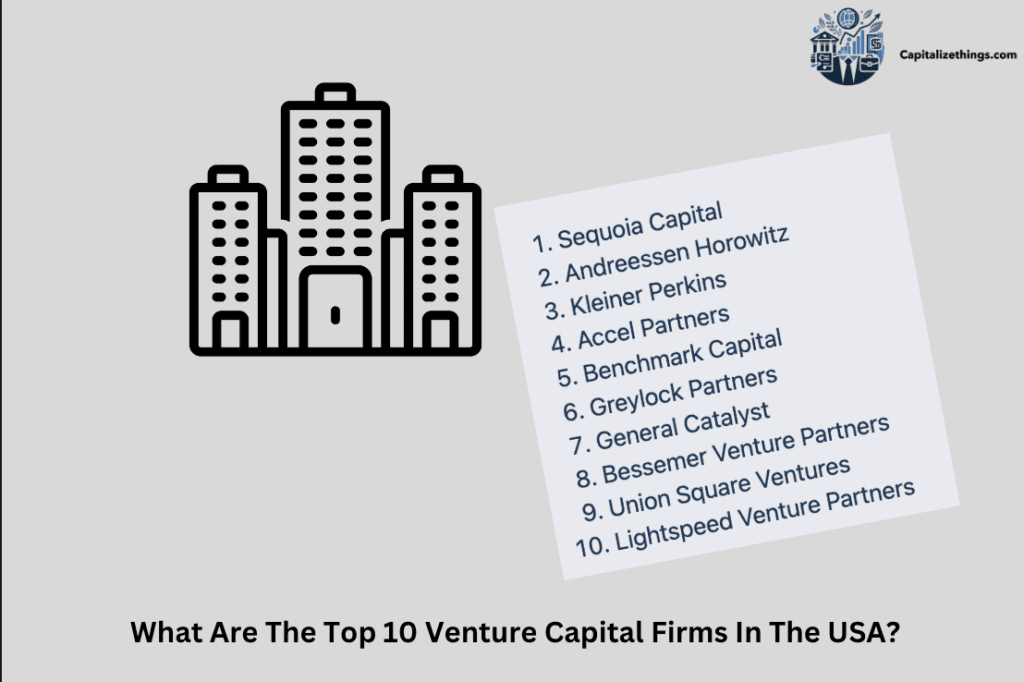
Is Venture Capital Stressful?
Venture capital is highly stressful due to its high-stakes nature and intense pressure for returns. Both entrepreneurs and investors face high pressure. Startups must grow quickly, and investors expect big returns. The risk of failure adds stress. Managing the business, raising funds, and meeting goals can be tough. Venture capital is challenging but can lead to great success.
How Does The Venture Capital Industry Work?
The venture capital industry operates through a system where firms invest pooled capital into high-growth startups in exchange for equity ownership. Investors give money to startups with high growth potential. In return, they receive part ownership of the company. Venture capitalists expect high returns if the company becomes successful. This is why they invest in risky, innovative businesses.
Venture capital firms raise money from large institutions and wealthy individuals. They then invest that capital into a portfolio of startups. The firms support these businesses with advice and connections. Venture capitalists search for companies that can grow rapidly, like technology and healthcare startups. This industry fuels innovation.
The industry works on a long-term timeline. Venture capitalists wait years for their investments to mature. If the company succeeds, they sell their stake for profits. This process brings new products and services to the market. The venture capital industry plays a key role in the startup ecosystem.
What Are The Top Industries For Venture Capital?
The top industries for venture capital are Technology, Healthcare, and Fintech. Technology companies are popular because they have high growth potential. Venture capitalists invest in software, artificial intelligence, and internet companies. Healthcare is another top industry, with many investments in biotech and medical devices. Fintech companies are also attractive to venture capitalists. These companies create financial technology like payment systems and online banking tools.
Other industries that attract venture capital include clean energy, consumer products, and e-commerce. These industries show strong growth and innovation, making them appealing to investors. Industries like artificial intelligence and blockchain are emerging areas of venture capital investment. These industries are still developing but show great potential. Venture capitalists look for companies in industries that can disrupt the market. By investing in these high-growth sectors, they hope to achieve high returns on their investments.
How Does A Venture Capital Firm Work?
A venture capital firm operates through a structured investment process of fundraising, deal sourcing, due diligence, and portfolio management. The firm looks for companies with high growth potential. They provide funding in exchange for equity, which means they own part of the business. Venture capital firms help startups grow by providing guidance, resources, and connections.
The firm’s success depends on the growth of its portfolio companies. Venture capitalists take an active role in the companies they invest in. They join the board of directors and help guide the business. Venture capital firms focus on finding innovative companies that can disrupt industries and create new markets.
Venture capital firms make money when their portfolio companies succeed. If a company grows and becomes profitable, the firm sells its shares for a return. This process can take several years. Venture capital firms are crucial for helping startups scale and bringing new products to market.
What Are The Objectives Of Venture Capital?
The main objectives of venture capital are to generate high financial returns and drive innovation through strategic investments in high-potential startups. Venture capitalists look for startups with the potential to grow fast. They provide funding in exchange for ownership in the company. Their goal is to sell that ownership for a profit when the company succeeds.
Another objective is to drive innovation. Venture capital helps bring new products and technologies to market. By investing in startups, venture capitalists fuel creativity and growth. They support companies that haven’t accessed other forms of funding. The goal is to create new leaders in the market.
Venture capitalists also aim to build strong relationships with entrepreneurs. They offer more than just money. They provide mentorship, guidance, and connections. Their goal is to help companies succeed and reach their full potential. Venture capital plays a key role in the startup ecosystem by supporting growth and innovation.
Who Funds Venture Capital?
Venture capital is primarily funded by institutional investors (pension funds, endowments, foundations) and high-net-worth individuals. These investors provide money to venture capital firms, which then invest in startups. Institutions like pension funds, endowments, and corporations are common sources of venture capital funding. They provide large amounts of money to help fund high-risk startups.
Wealthy individuals, known as angel investors, also provide funds for venture capital. These individuals have the resources to invest in startups. They often invest in early-stage companies before venture capital firms get involved. Both institutions and individuals fund venture capital because they seek high returns on their investments.
Venture capital firms raise money from these sources and create investment funds. They use these funds to invest in a portfolio of startups. The goal is to grow the companies and provide a return to the investors. Venture capital funding plays a crucial role in helping startups succeed.
How Do Venture Capitalists Make Money?
Venture capitalists make money by investing in startups and selling their shares for a profit. They provide funding to companies in exchange for ownership. When the employer grows and becomes worthwhile, venture capitalists sell their stocks. This is referred to as an exit, and it’s far how venture capitalists earn a return.
Venture capitalists frequently sell their stocks when the employer is received or goes public. An acquisition is when a larger organization buys the startup. A public presentation lets in the business enterprise to sell shares to the public. Both events deliver project capitalists the opportunity to make money.
Venture capitalists also make money from management fees. They price prices to the traders who offer the capital. This money covers the cost of dealing with the funding fund. However, the largest earnings come from the successful growth of the companies they put money into. Venture capitalists are seeking high returns from these investments.
Is Venture Capital High Paying?
Yes, venture capital is a high-paying field, especially for those at senior levels. Venture capitalists earn money from management payments and successful investments. The profits from investments can be large if a startup grows rapidly. Partners in a venture capital firm typically earn the most, while junior employees earn less but still get competitive salaries.
The high pay in venture capital comes from the risks involved. Venture capitalists invest in startups, which are risky businesses. Not all investments succeed, but the ones that do can generate massive returns. These high returns lead to high earnings for venture capitalists, making it a lucrative career.
How Much Can You Make In Venture Capital?
Venture capital professionals earn between $100,000 to several million dollars annually, with analysts starting at $100,000 and partners earning millions through salary and investment returns. Junior roles, such as analysts, can make around $100,000 per year. As venture capitalists gain experience and move up the ranks, their earnings increase. Senior roles, like partners, can earn millions of dollars annually from salary and investment returns.
The potential to make money in venture capital comes from both salary and profits from successful investments. A big win from a portfolio company going public or being acquired can lead to massive payouts. Successful venture capitalists can accumulate significant wealth over time, especially when managing large investment funds.
How To Invest In Venture Capital?
You can invest in venture capital through venture capital funds, angel investing, or crowdfunding platforms, with minimum investments typically starting at $250,000 for accredited investors. Most people invest in venture capital through funds managed by firms. These funds pool money from multiple investors to invest in startups. Individuals can invest in venture capital through these funds if they meet certain financial qualifications, like having a high net worth.
Another way to put money into venture capital is through angel investing. Angel investors are people who invest directly in early-stage startups. This requires knowledge of the industry and the ability to identify high-potential teams. Angel investors take on more risk but can earn large returns if the startup succeeds.
Regular people can also invest in venture capital via crowdfunding platforms. Some platforms allow smaller investments in startups. While these investments come with high risk, they provide an entry point for people who want to participate in venture capital investing. Each method offers different levels of involvement and risk in venture capital investing.
How To Get a VC To Invest In Your Company?
To secure VC investment, you need a compelling business plan, strong team, clear market opportunity, and scalable business model with potential for high returns. Startups must show that they have high growth potential and a solid market opportunity. Venture capitalists search for innovative products or services that disrupt industries. Clear financial projections and a robust team are also important for attracting investment.
Founders should network and build relationships with venture capitalists. Attending business events and seeking introductions can help startups get noticed. When pitching to venture capitalists, entrepreneurs need to explain how their business can generate high returns. VCs are looking for companies with the potential to scale quickly.
A strong exit strategy is also key to getting VC investment. Venture capitalists need to understand how they can eventually sell their shares for profit. Whether through an acquisition or public offering, having a clear path to exit can make your startup more appealing. Building trust and showing commitment can help secure funding.
How Hard Is It to Get VC Funding?
Only 1-2% of startups successfully secure venture capital funding, making it an extremely competitive process that typically takes 3-6 months of pitching to multiple investors. Venture capitalists only invest in a small percentage of the companies they review. Startups need to demonstrate exceptional growth potential, a unique product, and a solid team. Even with a strong business plan, the competition for VC funding is fierce.
Venture capitalists are selective because they invest in high-risk businesses. Most startups fail, so VCs focus on companies with the highest chance of success. Founders often need to pitch to many investors before securing funding. The process can take months and requires persistence, strong networking skills, and a clear value proposition.
How To Find Venture Capital Investors?
You can find venture capital investors through industry databases, networking events, startup accelerators, and professional referrals from other entrepreneurs. Many VCs specialize in specific sectors, so targeting the right investors is important. Look for firms with a track record of investing in companies like yours. Networking is also a great way to find VCs interested in your startup.
Attending industry conferences and startup events can help you connect with venture capitalists. Many VCs attend these events to meet potential investment opportunities. Building relationships through introductions from other entrepreneurs can also help you get noticed. The more you network, the better your chances of finding investors.
How To Make Money In Venture Capital?
Venture capitalists earn money through management fees (typically 2% of fund size) and carried interest (20% of fund profits), with successful partners earning $1-20 million annually. Making money in venture capital depends on both salary and investment returns. Venture capitalists earn management payments for overseeing investment funds. These charges are normally a percentage of the whole property underneath management. The actual money, however, comes from the profits made whilst portfolio groups grow or are sold for a better price.
The key to creating wealth in venture capital is to put money into high-capability startups. When those agencies are successful, task capitalists can promote their shares for big profits. A success through an acquisition or an initial public supplying (IPO) can cause considerable returns, making mission capital a beneficial subject.
In addition to exits, venture capitalists can also earn bonuses based totally on fund overall performance. The higher their portfolio companies do, the extra cash they can make. However, no longer all investments are successful, so assignment capitalists ought to cautiously select startups. This stability between excessive risk and excessive praise defines the undertaking capital incomes capability.
What Is Equity Financing In Venture Capital?
Equity financing is a funding method where startups receive capital by selling ownership shares to venture capitalists, typically ranging from 10-30% of company ownership in exchange for investment. Startups give venture capitalists a percentage of ownership in exchange for funding. This allows the business to grow without taking on debt. Venture capitalists gain equity, which means they share in the success or failure of the business.
In equity financing, venture capitalists provide funding in exchange for shares. The amount of equity they receive depends on the investment amount and the company’s valuation. As the business grows, the value of the equity can increase, providing returns to the venture capitalists. This model ties their profits directly to the company’s success.
One key feature of equity financing is that companies don’t need to repay the investment. Instead, investors make their money when the company succeeds, and they can sell their shares. Equity financing helps startups access the capital they need to grow while offering venture capitalists the chance to earn significant returns.
How Much Equity Should I Give To Venture Capital?
Startups should expect to give venture capitalists 20-30% equity in each major funding round, with total dilution typically reaching 50-70% by exit. The exact percentage depends on the startup’s valuation and how much funding is needed. Startups give up a portion of ownership in exchange for the capital they need to grow. This allows them to access funding without taking on debt.
The amount of equity given depends on the stage of the company and its financial situation. Early-stage companies give up more equity since they are riskier investments. Later-stage startups give less as they have proven success. Venture capitalists negotiate for a fair share of the business based on the investment they make.
What Is An Operator Venture Capital?
An operator venture capital firm is run by former successful entrepreneurs who combine investment capital with hands-on operational expertise to help portfolio companies grow. These firms are unique because their partners have hands-on experience building companies. They invest in startups and also carry their know-how to help the businesses grow. This offers the startups financial support and practical steering.
Operators venture capital firms differ from traditional venture capital because they provide more than just cash. The founders of these firms have real-world experience in scaling companies, so they actively participate in the startup’s development. This mentorship helps startups navigate challenges and grow faster. Operator VCs provide a mixture of capital and valuable insights.
One example of an operator venture capital firm is Andreessen Horowitz. It was founded by successful entrepreneurs who have built and sold companies. They use their experience to guide their portfolio companies. Operator venture capital is ideal for startups looking for both financial backing and expertise in managing a business effectively.
What Is Operating Agreement Venture Capital?
An operating agreement in venture capital is a legally binding document that defines ownership rights, management responsibilities, and profit-sharing arrangements between venture capitalists and founders. It specifies how decisions could be made, how profits shared, and the way disputes are resolved. This agreement is crucial for ensuring that everybody is familiar with their rights and responsibilities
The operating agreement often includes details about ownership structure, management roles, and the process for making major decisions. It helps prevent misunderstandings and conflicts by clearly defining how the business will operate. Venture capitalists and entrepreneurs should agree on the terms before finalizing the deal, ensuring clear collaboration.
Operating agreements also cover how the venture capitalists will exit the investment. This includes the terms for selling shares or being bought out. Having a clear operating agreement protects both parties and ensures that the venture capital partnership operates smoothly and effectively. This document provides a roadmap for the relationship between investors and founders. Learn about operating agreement basics for an LLC below which would surely help you avoid any mistakes.
What Is Ecosystem Venturing?
Ecosystem venturing involves investing in startups that operate within a larger industry ecosystem. Venture capitalists look for companies that can benefit from or contribute to an existing network of businesses, suppliers, and customers. This strategy helps startups grow faster by leveraging relationships and partnerships within their ecosystem.
Ecosystem venturing involves investing in startups that operate within a larger industry ecosystem. Venture capitalists seek companies that can benefit from or contribute to an existing network of businesses, suppliers, and customers. This approach helps new companies grow faster by tapping into established relationships and partnerships within their ecosystem.
The focus stays on creating value by connecting startups to other industry players. Venture capitalists look for businesses that naturally fit into broader market or technology trends. When investing in ecosystem-based startups, VCs help grow entire sectors, building connections that help multiple companies succeed.
Take a startup that creates software for major tech companies. By working within the tech ecosystem, they grow faster through natural partnerships with established businesses. The ecosystem approach helps startups thrive by plugging them into existing networks where they can add real value.
What Is An Example Of Venture Capital?
Sequoia Capital’s $150,000 investment in Apple in 1978 represents one of venture capital’s most successful investments, turning into billions of dollars after Apple’s IPO. This early investment helped Apple grow into one of the world’s biggest technology companies. The return on this investment was massive as Apple went public.
Venture capital firms often invest in startups with high growth potential. Another well-known example is Benchmark Capital’s investment in Uber. Benchmark invested $12 million in Uber’s early stages. As Uber expanded globally, the value of that investment skyrocketed, leading to significant returns for Benchmark when Uber went public.
These examples show how venture capital can help startups scale quickly. By providing both funding and guidance, venture capitalists play a key role in building successful businesses. Their early investments in promising companies often lead to large profits when those companies grow or go public.
What Are The Advantages And Disadvantages Of Venture Capitalists?
Venture capital offers startups rapid growth potential and strategic expertise but requires founders to sacrifice significant equity and accept intense pressure for quick returns. Venture capitalists also bring expertise and industry connections to help companies grow. These firms take on high risks, making it easier for new businesses to scale quickly and succeed.
However, undertaking capital has negative aspects too. Founders often surrender a huge part of ownership. This can cause loss of control over decision-making. Venture capitalists push for speedy growth, which align with the founder’s imaginative and prescient. The stress to deliver high returns can create stress for marketers.
Overall, task capital allows companies to develop faster however can limit a founder’s control. The alternate-off among rapid boom and ownership is prime. Some startups thrive with venture capital, at the same time as others battle to balance its demands. Choosing project capital depends on the founder’s desires and the enterprise stage.
| Advantages | Disadvantages |
| Access to large capital | Loss of control |
| Expertise and mentoring | Pressure for rapid growth |
| Industry connections | Dilution of ownership |
| No need for repayment | High risk for startups |
How To Get VC Funding For Startups?
To secure VC funding, startups need a strong business plan, clear market opportunity, and a compelling pitch deck targeting the right investors for their industry.
It’s critical to target traders who apprehend the market and business version. After locating the ability of capitalists, startups want to prepare a compelling pitch. This pitch must explain why the commercial enterprise is a great source of funding. It ought to spotlight the crew, the product, and the marketplace opportunity. A strong pitch can seize investor interest and cause further discussions approximately funding.
Finally, startups must be geared up to barter phrases. Venture capitalists will ask for equity in exchange for their investment. The amount of ownership given depends at the level of the commercial enterprise and the quantity of capital wanted. Founders ought to be organized to surrender a few manipulations in exchange for funding.
To Unlock premium access to capitalizethings.com personally curated database of 500+ active venture capital firms with detailed investment criteria and direct contact information. Early birds receive 3 months of free updates.
What Percentage Of Startups Receive Venture Capital Funding?
Only 1% of startups successfully secure venture capital funding, making it one of the most selective forms of business financing available. Venture capitalists look for organizations with excessive growth capacity. This makes it difficult for most startups to qualify. Many businesses need to discover other financing alternatives to develop.
Most startups depend on private savings, loans, or other forms of investment. Venture capitalists invest in companies that show promise for rapid expansion. These companies are typically in technology or innovative sectors. The small percentage receiving funding shows how selective venture capital is. Securing this investment is highly competitive.
How Much Does It Cost To Start A Venture Fund?
Starting a venture fund typically costs between $10 million and $50 million for smaller funds, while larger funds require even more capital, reaching hundreds of millions. This initial money comes from investors, who expect high returns. Creating a successful undertaking fund takes time and knowledge. Administrative costs for legal services, accounting, and management add to the expense. Venture funds also need a professional team to identify and manage investments. Marketing to attract investors and promote the fund is another cost. All these factors contribute to the overall cost of starting a venture fund.
The main challenge is securing the initial capital from investors. Most venture capitalists rely on wealthy individuals or institutions. These investors trust the fund to deliver high returns. Once the fund is established, it focuses on finding promising startups to invest in, hoping for significant payoffs in the future.
According to a report by Preqin, the average size of a venture capital fund in the United States in 2021 was $235.5 million, with a median of $50 million (Preqin, 2021). The report also states that the total venture capital raised globally in 2021 reached $643 billion, a record high (Preqin, 2021).
What Is Meant By Venture Backed In Business?
Venture-backed businesses are companies that receive funding from venture capital firms in exchange for equity. These businesses are supported by investors who believe in their high growth potential. The investment enables the company to grow rapidly. In return, investors receive equity in the company. This partnership aims to generate high returns when the business becomes successful.
Venture-backed businesses often operate in industries like technology or healthcare. These sectors offer rapid growth, making them attractive to investors. The investment helps these companies scale operations, enter new markets, or develop innovative products. Venture-backed businesses are expected to deliver high growth within a short period.
The success of a venture-backed business depends on its ability to meet investor expectations. Venture capitalists provide more than just money; they offer guidance and connections. This helps facilitate the company’s faster growth. However, the pressure to succeed is intense, as investors expect high returns on their investment.
What Are The Venture Capital Trends In Southeast Asia?
Venture capital investments in Southeast Asia are experiencing rapid growth, with technology startups in countries like Singapore, Indonesia, and Vietnam attracting the most funding. The region’s large population and growing digital economy make it an attractive market for investors. Fintech, e-commerce, and logistics are the top industries receiving venture capital.
The rise of unicorns, or companies valued at over $1 billion, is another trend. Southeast Asia now has several unicorns, particularly in fintech and ride-hailing services. Investors are seeking more opportunities in this market, anticipating strong returns as the region’s economy continues to grow.
Cross-border investments are also increasing, with companies from China and the U.S. entering Southeast Asia. These investments help local startups expand regionally and globally. As the venture capital landscape evolves, Southeast Asia is becoming a key destination for investors looking to tap into the region’s high growth potential.
Cross-border investments are also increasing, with companies from China and the U.S. entering Southeast Asia. These investments help local startups expand regionally and globally. As the venture capital landscape evolves, Southeast Asia is becoming a key destination for investors looking to tap into the region’s high growth potential.
What Is The Most Valuable Company In Southeast Asia?
The most valuable company in Southeast Asia is Sea Limited. Its e-commerce platform, Shopee, is one of the largest in Southeast Asia. Sea Limited’s success has attracted significant venture capital investment.
Sea Limited’s gaming division, Garena, is another major contributor to its value. Garena’s popular games, like Free Fire, have millions of users worldwide. The company’s digital financial services also play a key role in its growth. Sea Limited continues to expand its operations across multiple industries.
As of March 2023, Sea Limited’s market capitalization reached $97.4 billion, making it the most valuable company in Southeast Asia (Bloomberg, 2023). The company’s revenue in 2022 was $12.5 billion, representing a year-over-year growth of 56.1% (Sea Limited, 2023).
Which Country Is Best For Venture Capital?
The United States is the best country for venture capital, leading in venture capital funding, especially in Silicon Valley. The U.S. has the largest pool of investors and startups. Technology and innovation drive its venture capital industry. Many of the world’s most successful companies started with U.S. venture capital.
Other strong countries for venture capital include China, the United Kingdom, and Israel. These countries have developed robust ecosystems for startups and investors. China is growing rapidly in venture capital, particularly in technology and artificial intelligence. The United Kingdom is strong in fintech, while Israel is known for its tech startups.
How To Start A Career In Venture Capital?
To start a career in venture capital, a combination of finance, business, and networking skills is essential. Many people enter the industry after working in investment banking, consulting, or startups. A strong educational background, often with an MBA, is helpful. Building connections within the venture capital community is crucial for finding opportunities.
Internships at venture capital firms are an excellent way to get started. These roles provide hands-on experience evaluating startups and managing investments. Networking with professionals and attending industry events can also open doors. The venture capital field is competitive, so gaining expertise in related industries is valuable.
A passion for innovation and entrepreneurship is crucial for success in venture capital. Understanding how startups grow and what makes a business scalable is key. Those who succeed in venture capital are often skilled in identifying promising opportunities and building strong relationships with entrepreneurs and other investors. Apply through capitalizethings.com for exclusive VC Associate positions and receive 20% off our career coaching package. Our team validates your application and provides direct introductions to hiring partners.
What Is The Difference Between A VC Firm And A VC Fund?
A VC firm manages multiple VC funds, while a VC fund holds the money investors provide to grow startups. The main difference is that the firm controls the fund. Each has unique advantages and disadvantages in terms of management and returns.
| Pros | Cons |
|---|---|
| Strong management | High risk |
| Investor connections | Less control for startups |
| Multiple fund options | Long-term commitment |
What Is The Difference Between Venture Capital And Corporate Venture Capital?
Venture capital focuses on new companies, while corporate venture capital comes from large corporations investing in startups. The main difference is who provides the money. Corporate venture capital often has more control. Both have advantages and disadvantages in terms of investment and flexibility.
| Pros | Cons |
|---|---|
| More resources | Less startup freedom |
| Strategic partnerships | Focus on profits |
| Access to experts | Slower decision-making |
What Is The Difference Between Venture Capital And Private Equity?
Venture capital invests in early-stage startups. Private equity invests in mature businesses. The principal distinction is the degree of investment. Venture capital takes more danger however can provide bigger returns. Private equity offers more secure investments but with slower increase.
| Pros | Cons |
|---|---|
| High growth potential | High risk for failure |
| Small investments needed | Long-term returns |
| Support for startups | Less liquidity |
What Is The Difference Between Venture Capitalist And Angel Investor?
A venture capitalist works for a firm, while an angel investor uses personal funds. The main difference is where the money comes from. Angel investors take more personal risks. Venture capitalists often provide more money. Both help startups grow with different levels of control.
| Pros | Cons |
|---|---|
| Personal attention | Limited funds |
| High-risk tolerance | Limited connections |
| Early-stage involvement | Less professional support |
What Is The Difference Between Venture Capital And Venture Capitalists?
Venture capital refers to the money given to startups, while venture capitalists are the individuals who provide that money. The main difference is that one refers to funds, while the other refers to investors. Both are essential for helping startups grow, but each plays a different role.
| Pros | Cons |
|---|---|
| Access to funds | High pressure on startups |
| Professional expertise | Loss of control |
| Fast growth | High risk of failure |
What Is The Difference Between Equity Capital And Venture Capital Financing?
Equity capital comes from selling ownership in the company. Venture capital financing is a type of equity capital but focuses on early-stage companies. The main difference is who receives the money. Equity capital is broader and can come from many sources, while venture capital focuses on high-growth startups.
| Pros | Cons |
|---|---|
| Ownership shares | Dilution of control |
| Fast access to funds | Loss of ownership |
| Attracts more investors | High expectations |
Is Shark Tank A Venture Capitalist?
No, “Shark Tank” features angel investors, not venture capitalists. The show’s investors use private funds, in contrast to venture capitalists, who manage funds from others. However, both aim to support startups and generate returns. “Shark Tank” is closer to angel investing in its investment approach and risks involved.
As of 2021, the “Shark Tank” investors have collectively invested over $200 million in more than 1,000 startups featured on the show (CNBC, 2021). The most successful “Shark Tank” investment to date is Bomba Socks, which has generated over $225 million in sales since appearing on the show in 2014 (CNBC, 2021).
What Are The 3 Forms Of Entrepreneurial Venture?
The 3 forms of entrepreneurial ventures are small businesses, scalable startups, and large companies. Small businesses focus on steady growth. Scalable startups aim for rapid growth and expansion. Large companies focus on innovation within established markets. Each type offers unique challenges and opportunities for entrepreneurs based on their growth objectives.
What Is The Largest Venture Capital Firm?
Sequoia Capital is the largest venture capital firm, having invested in some of the most successful startups in the world. Sequoia focuses on technology, healthcare, and other high-growth industries. The company has helped companies like Google, Apple, and Airbnb achieve tremendous success in their respective markets.
As of 2021, Sequoia Capital had over $80 billion in assets under management, making it the largest venture capital firm globally (PitchBook, 2021). Some of Sequoia’s most notable investments include Apple, Google, Oracle, PayPal, YouTube, Instagram, WhatsApp, and Airbnb (Sequoia Capital, 2021).
How Big Is The Vc Industry?
The VC industry is massive, with global venture capital investments reaching over $400 billion in 2023. This industry plays a crucial role in funding innovative startups and driving economic growth. It supports the development of technology, healthcare, and other key industries worldwide.
According to a report by KPMG, global venture capital investment reached a record high of $621 billion in 2021, a 111% increase from the previous year (KPMG, 2022). The report also states that the number of venture capital deals worldwide reached 38,644 in 2021, a 32% increase from 2020 (KPMG, 2022).
What To Study For Venture Capital?
To work in venture capital, studying finance, business, or entrepreneurship is recommended. An MBA can help, but practical experience is also valuable. Learning how startups grow, how to manage investments, and understanding markets is fundamental. Many venture capitalists come from investment banking, consulting, or even startup backgrounds before joining the field.
What Is The Oldest Venture Capital Firm?
The oldest project capital company is American Research and Development Corporation (ARDC). It was based in 1946. ARDC made one of the first major capital investments in Digital Equipment Corporation (DEC), which became noticeably a success. ARDC helped set up undertaking capital as a way to fund and grow new organizations.
ARDC’s investment in DEC in 1957 was $70,000 for a 70% stake in the company. When DEC went public in 1968, ARDC’s investment was worth $355 million, representing a return of over 500 times the initial investment (Gompers & Lerner, 2001).
What Is A Venture Business?
A venture business is a startup funded by investors who seek high returns. These businesses often focus on innovation and rapid growth. Venture businesses generally operate in industries like technology or healthcare. They receive funding in trade for equity, with the intention of becoming profitable and handing over returns to investors.
Is Venture Capital Good For Small Business?
Venture capital can be beneficial for small businesses that require rapid growth, but it also comes with risks, such as loss of control and pressure for quick returns. It provides funds to expand operations, enter new markets, or increase products. However, not all small businesses are suitable for venture capital.
Can LLC Get Venture Capital?
Yes, an LLC can receive venture capital, although it is less common than C-corporations. Venture capitalists prefer C-corporations for tax and legal reasons. An LLC can convert to a C-corporation to make it easier to get funding. The choice depends on the business’s growth plans and the investor’s preferences.
A survey by the National Venture Capital Association (NVCA) found that 95% of venture-backed companies in the United States are structured as C-corporations, while only 5% are structured as LLCs (NVCA, 2019). The survey also revealed that the primary reason for choosing a C-corporation structure is the ability to issue preferred stock to investors (NVCA, 2019).
What Is The Minimum Size Of A Venture Capital Fund?
The minimum size of a venture capital fund varies but typically starts at around $10 million. Smaller funds focus on early-stage startups, while larger funds invest in more mature companies. The size of the fund determines the types of companies it can support and the number of investments it can make.
What Is The Difference Between Venture-Backed And Bootstrapped?
A venture-backed company receives external funding from investors, while a bootstrapped company relies on personal savings or revenue to grow. Venture-backed companies grow faster but give up some control. Bootstrapped companies retain full ownership but grow more slowly. Both approaches have advantages depending on the business’s goals.
Where Do Venture Capitalists Get Their Money?
Venture capitalists raise money from limited partners, which include wealthy individuals, pension funds, or institutions. These investors put money into the VC fund expecting high returns. The venture capitalists manage the fund and invest in startups. In return, they receive a percentage of the profits when the startups are successful.
What Is The Best Law Firm For Venture Capital?
The best law firms for venture capital include Cooley LLP, Wilson Sonsini Goodrich & Rosati, and Gunderson Dettmer Stough Villeneuve Franklin & Hachigian LLP. These companies specialize in operating with startups and assignment capitalists. They offer criminal advice for funding deals, organization formation, and highbrow property safety.
What Are The Top Us Venture Capital Law Firms?
Here are 10 top venture capital law firms in the U.S.:
- Cooley LLP
- Wilson Sonsini Goodrich & Rosati
- Gunderson Dettmer
- Fenwick & West LLP
- Orrick, Herrington & Sutcliffe LLP
- Latham & Watkins LLP
- Goodwin Procter LLP
- DLA Piper
- Perkins Coie LLP
- Morrison & Foerster LLP
Is A Venture Capitalist A Good Job?
A venture capitalist job is rewarding for those who enjoy high risks and big rewards. It offers the risk to work with startups and make massive returns. However, it’s also annoying and calls for robust financial know-how and marketplace perception. Success relies upon selecting the right startups to spend money on.
Is Venture Capital Hard To Get Into?
Yes, venture capital is very hard to get into. The industry is aggressive, with few open positions. Many assignment capitalists have enjoyed funding banking, consulting, or startups. Building connections and gaining experience in associated fields is essential. Success requires strong networking, financial talents, and a deep know-how of market traits.
Is Venture Capital A Good Investment?
Venture capital can be a good investment for those seeking high returns. It entails making an investment in startups with high boom potential. However, it also consists of high dangers, as many startups fail. Investors must cautiously select which agencies to again. The excessive danger can cause large rewards if the enterprise succeeds.
How Do You Identify Venture Capital?
You identify venture capital by looking for investment in early-stage startups. Venture capitalists offer a price range in exchange for equity. These investors frequently pay attention to excessive-increased industries like generation and healthcare. They provide now not the most effective money however they also know-how to assist startups develop. Successful challenge capital is ready finding the right opportunity.
How Much Capital Do You Need To Start A Venture Capital Firm?
To start a venture capital firm, you need at least $5 to $10 million. The cash comes from constrained partners who consider you to put money into startups. You want to revel in a robust network, and know-how of the startup global. Raising enough capital is one in every of the largest demanding situations in beginning a VC organization.
What Are The Due Diligence Considerations In A Joint Venture?
Due diligence in a joint venture includes financial checks, legal reviews, and understanding the partner’s background. You want to make sure the business is financially wholesome. Legal documents have to be clear, and dangers diagnosed. It’s vital to understand your accomplice’s dreams, reputation, and business practices earlier than agreeing to a joint challenge.
Is There Venture Capital In India?
Yes, India has a growing venture capital market. Many firms put money into era, e-trade, and healthcare startups. The U . S . A Is turning into a hub for new commercial enterprise possibilities. Large global companies like Sequoia Capital and Accel are energetic in India. Local companies like Kalaari Capital also guide Indian startups.
What Is A VC Growth Fund?
A VC growth fund focuses on later-stage companies that need capital to expand. These groups are already mounted however want finances to grow faster. The growth fund facilitates product development, getting into new markets, or acquiring other agencies. It targets agencies with demonstrated achievement that need extra money to scale.
What Is The 10x Rule For Venture Capital?
The 10x rule means venture capitalists aim to invest in startups that can return 10 times their initial investment. It’s a high-risk strategy. It’s an excessive-threat approach. For every ten investments, one succeeds and returns 10x, whilst others fail. The 10x rule courses VCs to discover startups with explosive growth capacity.
What Is The Deal Making Process Of Venture Capital?
The venture capital deal-making process involves several steps. First, the VC identifies a potential startup. Then, they behave due diligence, reviewing the organization’s financials and market position. After that, the phrases of funding are negotiated. Once each facet agrees, the deal is closed, and the VC affords the price range.
What Is A Waterfall Model In Venture Capital?
The waterfall model in venture capital is how profits are distributed. It units the order in which investors acquire returns. Typically, the VC organization receives its share first, then limited companions get hold of their earnings. The version ensures that traders receive a commission based totally on their risk and contribution.
What Is The American Waterfall In Venture Capital?
The American waterfall in venture capital is a type of distribution model. In this version, profits are disbursed after the investor’s complete capital is lower back. This guarantees the investor is paid back earlier than the fund managers or different stakeholders obtain their proportion. It is common in the U.S. Task capital market.
What Is The Liquidation Waterfall In Venture Capital?
The liquidation waterfall in venture capital outlines the order in which a company’s assets are distributed when it is sold or liquidated. It determines the order wherein lenders, traders, and shareholders are paid. The maximum senior investors are paid first. Once they’re absolutely compensated, others acquire their share primarily based on their investment ranking.
Does venture capital increase reinvestment risk?
Venture capital can sometimes heighten reinvestment risk as startups funded by VCs often require further rounds of capital. This demand can result in mismatched cash flows, particularly if early successes don’t generate the expected returns or need more capital to sustain growth.
Can venture capitalists partner with angel investors?
Yes, venture capitalists often work alongside angel investors in funding early-stage startups. Angel investors typically provide the initial capital to help companies take off, while venture capital firms come in later to scale operations. This partnership bridges the gap between startup phases and growth stages.
Is venture capital suited for risk-averse investors?
Venture capital can be suited for risk-averse investors if approached strategically. By investing in later-stage startups with proven business models, investors reduce risks while still enjoying potential returns from growth.
Do venture capital funds invest in risky asset classes?
Yes, venture capital funds primarily invest in risky asset classes, focusing on startups or emerging companies that have innovative potential. The nature of these businesses, often lacking an established track record, inherently places them in higher risk categories compared to more traditional investment avenues.
Do venture capital firms measure investment risk?”
Yes, venture capital firms rigorously evaluate risk by conducting due diligence. They assess market conditions, the potential for scalability, and the financial stability of startups. By factoring in these variables, they ensure calculated exposure to possible losses, focusing on industries with higher returns despite their inherent risks.
Do chartered financial planners offer venture capital insights?
Chartered financial planners provide valuable insights into venture capital by assessing market conditions, startup viability, and financial risk. Their expertise helps investors navigate the complexities of early-stage financing while ensuring that venture capital aligns with broader financial goals, offering a balanced approach to high-return opportunities.
Connect with our seasoned venture capital experts for comprehensive startup valuation analysis and get personalized investment strategies. Reach out at +1 (323)-456-9123 to schedule your complimentary 15-minute discovery call with our team at capitalizethings.com of email us via our services form or contact form and we normally reply in 1-3 business days.
Does venture capital involve assessing investment risk capacity?
Yes, venture capital necessitates evaluating a company’s investment risk capacity. Before allocating funds, venture capitalists meticulously assess the financial endurance, business model sustainability, and scalability potential. Understanding risk tolerance allows for tailored funding strategies, ensuring that both high-return opportunities and manageable risks align effectively.
Conclude:
Venture capital plays a critical role in funding innovative startups with high growth potential. It connects traders with new agencies, imparting them with the vital finances to scale and prevail. While task capital comes with dangers, it additionally offers big rewards for each investor and the startup. Understanding the variations among assignment capital, personal equity, and angel investing is vital for entrepreneurs in search of investment.
With a variety of venture capital firms and funds available, startups have numerous options to consider. However, the selection to be looking for venture capital needs to be weighed carefully, considering the ability to manage and the pressure to deliver short returns. Overall, venture capital remains an essential force in driving financial innovation and increase.

Larry Frank is an accomplished financial analyst with over a decade of expertise in the finance sector. He holds a Master’s degree in Financial Economics from Johns Hopkins University and specializes in investment strategies, portfolio optimization, and market analytics. Renowned for his adept financial modeling and acute understanding of economic patterns, John provides invaluable insights to individual investors and corporations alike. His authoritative voice in financial publications underscores his status as a distinguished thought leader in the industry.

